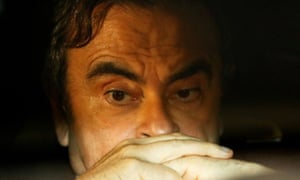At press conference in Lebanon the former Nissan boss may reveal how he jumped bail

Carlos Ghosn has argued that his arrest was proof that the Japanese justice system was guilty of double standards.
Photograph: Issei Kato/Reuters
Carlos Ghosn is to make his first public appearance since his extraordinary escape from Japan, where he faced charges of financial misconduct while chairman of Nissan.
Ghosn became the world’s most famous fugitive after he boarded a private jet from Japan – reportedly via a bullet train and inside a large case for audio equipment – to Turkey and on to Lebanon on 29 December.
At a highly anticipated press conference due to be held in Beirut on Wednesday afternoon, speculation is growing that he will divulge details of his escape and flesh out claims that he was the victim of a “coup” by former colleagues determined to wreck his plans to merge Nissan and Renault.
Maria Bartiromo of Fox Business said Ghosn had told her over the weekend that he has “actual evidence” and documents proving there was a plot to “take him out” in response to his plan to merge the Japanese and French automakers.
There is also the mouthwatering prospect that Ghosn, who consistently denied the charges throughout his detention and while out on bail, will name Japanese government officials he claims worked with Nissan executives to oust him, two decades after he rescued the company from near bankruptcy. The former auto tycoon has yet to publicly back those allegations with evidence.
Dozens of local and international journalists are expected to attend the press conference at Lebanon’s press syndicate headquarters. Lebanese authorities have not commented on Ghosn’s first public appearance since he fled Japan and it was not immediately clear if they planned to summon him for questioning.
Ghosn, too, will face unprecedented public scrutiny over his professional conduct, namely allegations that he under-reported his salary and used Nissan money for private investments and to pay hundreds of thousands of dollars in consulting fees to his elder sister Claudine.
Having argued that his arrest was proof that the Japanese justice system was guilty of double standards, he may be pressed to divulge if other Nissan executives should have been arrested along with him. He may also be asked to explain why, having proved Nissan’s saviour in the late 1990s, he was unable to convince sceptics that a merger with Renault was in its interests.
Aspects of his personal life may also be called into question, including the absence of a single Nissan executive – and only two from Renault – at a lavish party he and his wife, Carole, hosted at Versailles in 2014 to mark the 15th anniversary of the Renault-Nissan alliance.
Ghosn will speak hours after prosecutors attempted to raid the offices of his legal team in Tokyo to seize a computer to which Ghosn had limited access while out on bail.
His lawyers, however, refused to hand over the computer, citing attorney-client confidentiality.
Japanese media reports said prosecutors believe the computer may contain details of Ghosn’s escape, which has caused severe embarrassment to the country’s authorities and prompted a review of security at its airports.
“Tokyo district prosecutors came to our office with a warrant to seize items used by Mr Ghosn such as a computer,” the defence team said in a statement.
“In light of attorney-client confidentiality obligations, we exercised the right to refuse the seizure, as permitted under Article 105 of the Code of Criminal Procedure, and asked them to leave without entering our office.”
Ghosn has said little publicly since he fled to Lebanon, where he holds citizenship and spent part of his childhood. In a statement released soon after his arrival, the 65-year-old, who also has Brazilian and French citizenship, said he had escaped to avoid political persecution by Japan’s “rigged” justice system.
Lebanon, which has no extradition agreement with Japan, has said Ghosn entered the country legally with a French passport and a Lebanese identification card.
Ghosn has also claimed that his wife played no part in his escape. Japanese prosecutors obtained an arrest warrant for Carole Ghosn on Tuesday, alleging that she had committed perjury during a court appearance in Tokyo last year.